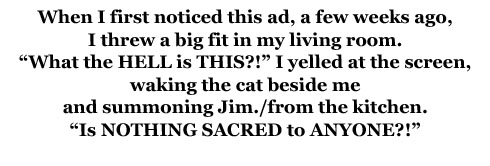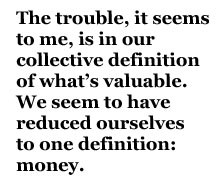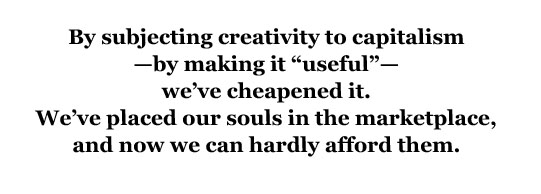You’ve probably seen this video: fast-cut scenes of tornado chasers, children hiking, a man standing over a massive waterfall, an engineer staring up at a wind turbine, a pilot in a rescue helicopter, Indian women dancing, hockey players skating, a marching band turning their instruments in sync. In the background, Robin Williams feverishly recites Walt Whitman in one of the glorious monologues of The Dead Poets’ Society:
We don’t read and write poetry because it’s cute. We read and write poetry because we are members of the human race And the human race is filled with passion. And medicine, law, business, engineering, these are noble pursuits and necessary to sustain life. But poetry, beauty, romance, love, these are what we stay alive for. To quote from Whitman, “O me! O life!… of the questions of these recurring; of the endless trains of the faithless… of cities filled with the foolish; what good amid these, O me, O life?” Answer: that you are here; that life exists, and identity; that the powerful play goes on and you may contribute a verse; that the powerful play goes on and you may contribute a verse. What will your verse be?
And what is the goal of this passionate display? To sell you an iPad.
Oh joy. Oh rapture.
When I first noticed this ad, a few weeks ago, I threw a big fit in my living room. “What the HELL is THIS?!” I yelled at the screen, waking the cat beside me and summoning Jim from the kitchen. “Is NOTHING SACRED to ANYONE?!”
It isn’t just that The Dead Poets’ Society is an incredibly wonderful film, which is being wholly distorted to the profiteering machinations of a massive corporate evil. It isn’t just that the entire plot of The Dead Poets’ Society is about stepping back, removing yourself from the flow of the churning economic machine, in order to examine yourself and the world more deeply—and that this ad is suggesting that “sucking the marrow” of life, as the movie exulted, is best achieved via an $800 electronics purchase.
No, what really bugs me isn’t even really the ad itself. It’s how seamlessly this ad represents everything else in our contemporary world. It’s a perfect ad for our times, really. And I’m sure it will be enormously successful.
And that is what makes me angry.

I’m reminded of an introductory speech course I attended in college. The first day of a college course, no matter the subject, is typically the same. Everyone settles into their seats, establishes their attendance, and the professor distributes the syllabus and describes the purposes of the class—in this case, the purpose was to instruct us on the manner of constructing and presenting logical arguments. In this particular class, however, once these introductory matters were concluded, the professor informed us, (reluctantly, to his credit,) that the department required him to also discuss the reasons why “speech” was important. As the lights dimmed, a low groan of recognition spread among the students. A powerpoint presentation—the most effective torture conceived of by our corporate overlords.
Like all powerpoint presentations, it was painfully dull and clearly assembled under duress, but the gist of the matter was this: “Speech” was an awfully important course for all college students because CEO’s valued effective communication among their employees above all other traits. Nine out of ten Fortune 500 companies agreed (or some such nonsense,) that Speech departments turned out the best workers for their companies.
It was excruciating, not least of all because the professor was obviously violently opposed to being reduced in such a manner, and read aloud the bullet points of the presentation as if they were, in fact, bullets—each aimed at his heart.
This, I imagined him thinking, This is how they reckon the “worth” of my decades of expertise, my study of logic and human persuasion—churning out another generation of corporate managers and Human Resources professionals. This is my bloody legacy.
The trouble, it seems to me, is in our collective definition of what’s valuable. We seem to have reduced ourselves to one definition: money. If an action results in accumulating more of it, or if the action is a result of its accumulation, (like the colorful adventures of the iPad commercial,) then that action is valuable. But so much is lost from that definition.
Is it valuable, then, for a plumber to have read Shakespeare? Only if, in addition to being a plumber, he is also a human.
Without an iPad in hand, is there value in looking out over the gaping maw of a waterfall? Only if your soul has its own worth, separate from the envy and exhortations of your facebook friends.
Is there value to poetry? What about the poetry that no one ever reads? Emily Dickinson wished to have all her papers burned after her death. If her wish had been carried out, would she still have been a “great” poet, or is greatness only conferred by the recognition of generations and the money accumulated by the sale of thousands and thousands of books?
A couple of years ago, I remember reading in Newsweek about a decades-long study of childhood creativity, referred to as “Torrance’s Tasks.” The title of the article was “The Creativity Crisis,” and the authors were lamenting the fact that, since 1990, creativity in American children had been on the wane. While I absolutely agreed with the writers that creativity is important, and that it is increasingly stifled by standards-driven teaching and mind-numbing technology, I was a bit disgruntled at how the writers chose to make their case.
The need for creativity, according to these authors, was an economic need. According to the article:
Those who came up with more good ideas on Torrance’s Tasks grew up to be entrepreneurs, inventors, college presidents, authors, doctors, diplomats, and software developers. Jonathan Plucker of Indiana University recently reanalyzed Torrance’s data. The correlation to lifetime creative accomplishment was more than three times stronger for childhood creativity than childhood IQ.
One wonders if the warnings would be so urgent if more of these creative children had grown up to be roofers, preachers, plumbers, trash collectors, teachers, homemakers, and dog-walkers. Despite the fact that, as the authors note, “The necessity of human ingenuity is undisputed,” the article presented its case as if someone, somewhere, were arguing against them. Their first argument immediately reminded me of that poor, beleaguered Speech professor: “A recent IBM poll of 1,500 CEOs identified creativity as the No. 1 “leadership competency” of the future.”
Great. Because our current crop of CEO’s is truly a shining beacon of humanity, nobility and goodness.
To be fair, the article goes on to mention the “matters of national and international importance that are crying out for creative solutions, from saving the Gulf of Mexico to bringing peace to Afghanistan to delivering health care,” but one wonders if any lesser achievements would merit their attention. The model creative child of the article, Ted Schwarzrock, grew up to be independently wealthy, we’re told. But if one of those creative children grew up, as some of them must have, to be the most ingenious gardener in his neighborhood, or the best chef in Peoria, Illinois, would that be a sufficient argument to promote and nurture creativity? Would there be an argument to completely overthrow our current models of education, toss out all those scantron tests and rote memorization drills, just to let our little humans grow up to be interesting, well-rounded people, if it wouldn’t provide even the slightest boost to our GDP?
Well, yes. There is a perfectly good argument for nurturing better thinking, free expression and open discussion, regardless of economic gain. It just isn’t an argument I’ve heard recently. And that argument is this: some things are just good. Art is just good. Beauty is just good. Poetry and nature are just good. In themselves. Just like the damnable iPad commercial says, “But poetry, beauty, romance, love, these are what we stay alive for.” Somehow, in our capitalist fervor, we’ve made problematic the very human qualities that shouldn’t be up for argument. No one needs to tell me that reading a book is “healthy,” that it will make me thinner, or kinder, or, (heaven forbid,) a better employee. Reading is good because it connects one human mind to the mysterious collective mind of humanity. In reading, you meet your soul on its home turf. Even if it made me fat, mean and unemployable, I would read. And I would want my kids reading as well.
By subjecting creativity to capitalism—by making it “useful”—we’ve cheapened it. We’ve placed our souls in the marketplace, and now we can hardly afford them. Do you have the soul of an artist? There’s an app for that. Do you see the world differently? Capture it with this iPad and maybe your visions will go viral. Want to know your value to society? Check your credit report.














Well stated, Tonya! Once, I had almost entered into a conversation that I thought sounded interesting, only to find out they were all agog talking about some computer fantasy game, and its accompanying television series. I was clueless about both. The fine line between reality and fantasy is surely blurring. I fear we also live in a society made up of “bread and circuses”. No creative good can come out of that, can it? (I don’t own an iPhone, or iPad, BTW. Just an old desktop computer)
Well stated, Monica!
And…in 1930 in a dream analysis seminar Carl Jung said, “One-sided businessmen are always inclined, when something goes wrong, to become hypochondriac. Their spirits are to be bought at a drug store as a sort of substitute for spiritual development.” And a few pages later, “Nobody can get as one-sided as a financier.”
85 years later, what has changed? Only that women as well as men now have every right to throw themselves this far out of balance – and can’t turn in any direction without encountering a tech message.that it’s normal to do this to yourself.